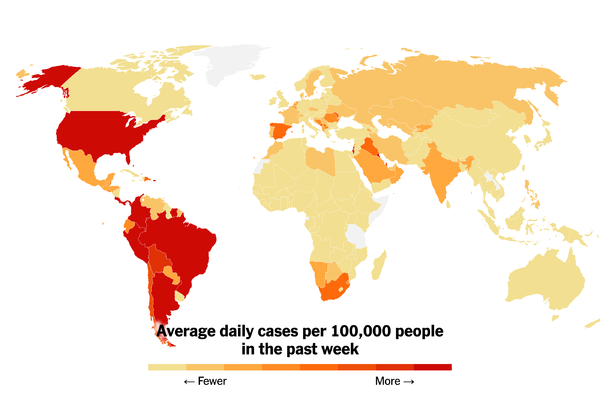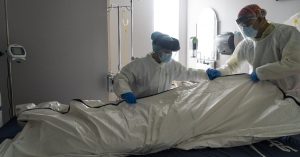This is the Coronavirus Briefing, an informed guide to the global outbreak. Sign up here to get the briefing by email.
-
The U.S. budget deficit grew to a record $2.8 trillion for the fiscal year to date as the federal government continued to pump money into the economy.
-
Britain fell into its deepest recession on record during the lockdown.
-
The Big 12 college football conference, which includes Oklahoma and Texas, said it planned to hold league games starting next month.
-
Get the latest updates here, as well as maps and trackers for U.S. metro areas and vaccines in development.
A divisive start to the school year
The first U.S. schools to resume in-person teaching have shown the perils of reopening with the virus still out of control, painting a picture of chaos and deeply divided communities. In one district in Georgia, nearly 1,200 students and staff members have already been ordered to quarantine.
By the end of the first week of classes in Cherokee County, Ga., more than 10 principals had informed families of virus cases at their schools, prompting mass two-week isolation orders. One high school has closed its doors until the end of the month. But the situation has been viewed very differently by parents in the community.
“You have these people saying, ‘We told you so. This shows you how dangerous this is,’” our colleague Richard Fausset, a correspondent based in Atlanta, told us. “And then you have people saying, ‘No, this is how it’s going to look from now on.’”
As schools in other parts of the country prepare for the academic year, two states are emblematic of the debate over in-person instruction.
In Florida, Gov. Ron DeSantis, a Republican, and the education commissioner have demanded Hillsborough County School District, which covers Tampa and is one of the nation’s largest, to reverse its plans to provide only remote education initially. An executive order was issued in July requiring the option of in-person classes.
Latest Updates: The Coronavirus Outbreak
In New Jersey, Gov. Philip Murphy, a Democrat, is allowing districts to offer classes exclusively online, relaxing his original mandate for some form of in-person teaching. The decision came after the state’s teachers union criticized a lack of uniform safety guidelines and called for an all-virtual start to the school year.
Who’s responsible for the virus? Pennsylvania State University is requiring students to sign a waiver saying they accept the risk of infection on campus and absolve the institution of liability in case of infection.
Deepening divisions on masks
A small piece of cloth continues to divide Americans. Mask wearing is still fiercely debated — largely along political lines — and has led to a well-documented spate of arguments, assaults and arrests.
In Illinois, where coronavirus cases are on the rise, the governor enacted a measure last week that makes it a felony to assault a retail worker who is enforcing a mask-wearing policy. In Miami Beach, Fla., where mask wearing is now required, people can face a fine of a minimum of $50 for not wearing a face covering, even when outdoors and social distancing. In the month since the rule was enacted, the city has handed out $14,000 in fines, though most have not been collected.
But the sheriff of Marion County, Fla., has come down hard on the opposite side. Sheriff Billy Woods has ordered his deputies not to wear a mask on duty in almost all circumstances, and has banned visitors to sheriff’s offices from wearing them. He said the rule was to improve communication, because masks can muffle officers’ voices.
After thousands of unmasked bikers converged at a motorcycle rally last week in Sturgis, S.D., the governor of New Hampshire, Chris Sununu, switched course ahead of a motorcycle rally in his state and issued an order requiring masks at gatherings of more than 100 people.
“Sturgis was a clear warning sign to us,” Mr. Sununu said. “I don’t think anyone saw the photos out of Sturgis and thought, ‘That looks safe.’”
The Coronavirus Outbreak ›
Frequently Asked Questions
Updated August 12, 2020
-
Can I travel within the United States?
- Many states have travel restrictions, and lots of them are taking active measures to enforce those restrictions, like issuing fines or asking visitors to quarantine for 14 days. Here’s an ever-updating list of statewide restrictions. In general, travel does increase your chance of getting and spreading the virus, as you are bound to encounter more people than if you remained at your house in your own “pod.” “Staying home is the best way to protect yourself and others from Covid-19,” the C.D.C. says. If you do travel, though, take precautions. If you can, drive. If you have to fly, be careful about picking your airline. But know that airlines are taking real steps to keep planes clean and limit your risk.
-
I have antibodies. Am I now immune?
- As of right now, that seems likely, for at least several months. There have been frightening accounts of people suffering what seems to be a second bout of Covid-19. But experts say these patients may have a drawn-out course of infection, with the virus taking a slow toll weeks to months after initial exposure. People infected with the coronavirus typically produce immune molecules called antibodies, which are protective proteins made in response to an infection. These antibodies may last in the body only two to three months, which may seem worrisome, but that’s perfectly normal after an acute infection subsides, said Dr. Michael Mina, an immunologist at Harvard University. It may be possible to get the coronavirus again, but it’s highly unlikely that it would be possible in a short window of time from initial infection or make people sicker the second time.
-
I’m a small-business owner. Can I get relief?
- The stimulus bills enacted in March offer help for the millions of American small businesses. Those eligible for aid are businesses and nonprofit organizations with fewer than 500 workers, including sole proprietorships, independent contractors and freelancers. Some larger companies in some industries are also eligible. The help being offered, which is being managed by the Small Business Administration, includes the Paycheck Protection Program and the Economic Injury Disaster Loan program. But lots of folks have not yet seen payouts. Even those who have received help are confused: The rules are draconian, and some are stuck sitting on money they don’t know how to use. Many small-business owners are getting less than they expected or not hearing anything at all.
-
What are my rights if I am worried about going back to work?
- Employers have to provide a safe workplace with policies that protect everyone equally. And if one of your co-workers tests positive for the coronavirus, the C.D.C. has said that employers should tell their employees — without giving you the sick employee’s name — that they may have been exposed to the virus.
-
What is school going to look like in September?
- It is unlikely that many schools will return to a normal schedule this fall, requiring the grind of online learning, makeshift child care and stunted workdays to continue. California’s two largest public school districts — Los Angeles and San Diego — said on July 13, that instruction will be remote-only in the fall, citing concerns that surging coronavirus infections in their areas pose too dire a risk for students and teachers. Together, the two districts enroll some 825,000 students. They are the largest in the country so far to abandon plans for even a partial physical return to classrooms when they reopen in August. For other districts, the solution won’t be an all-or-nothing approach. Many systems, including the nation’s largest, New York City, are devising hybrid plans that involve spending some days in classrooms and other days online. There’s no national policy on this yet, so check with your municipal school system regularly to see what is happening in your community.
Resurgences
-
In Australia, the state of Victoria, which is still fighting the country’s worst outbreak, reported a daily record of 21 deaths today.
-
As France faces an uptick in cases, the Paris marathon has been canceled after two postponements.
-
Parts of New Zealand are under a partial lockdown again after confirmation of the country’s first locally transmitted cases in months.
-
In India, a former president, Pranab Mukherjee, 84, has been put on a ventilator after testing positive for Covid-19 this week.
Here’s a roundup of restrictions in all 50 states.
What else we’re following
-
Bars and restaurants have seeded scores of outbreaks this summer. In some states, they have been linked to up to a quarter of new cases.
-
Nearly three dozen current and former members of a federal health advisory committee warned that the Trump administration’s new coronavirus database is placing an undue burden on hospitals and will have “serious consequences on data integrity.”
-
The virus mortality rate at San Quentin State Prison in California, where more than two-thirds of the population has fallen ill, shows the disastrous cost of herd immunity, The Los Angeles Times reports.
-
Dr. Anthony S. Fauci criticized Russia’s rushed clearance of a coronavirus vaccine, saying he doubted that the country actually proved that it was safe and effective.
-
What happened to the cruise ships sidelined by the virus? In Britain, they’re drifting in the English Channel, where they’ve become a tourist attraction in their own right, the BBC reports.
-
The pandemic might change unexpected parts of our lives for years to come. Here are 11 fun things that we may never do the same way again.
What you’re doing
I was my daughter’s study buddy for her University of Texas online Operations Management class this summer. She aced it and wants to continue our collaboration through the fall semester. We’re gobsmacked both at how much we enjoyed it and that we didn’t kill each other the first week. What a surprise to be back in college at 65.
— Lucia Johnson, Austin, Texas
Let us know how you’re dealing with the outbreak. Send us a response here, and we may feature it in an upcoming newsletter.



















